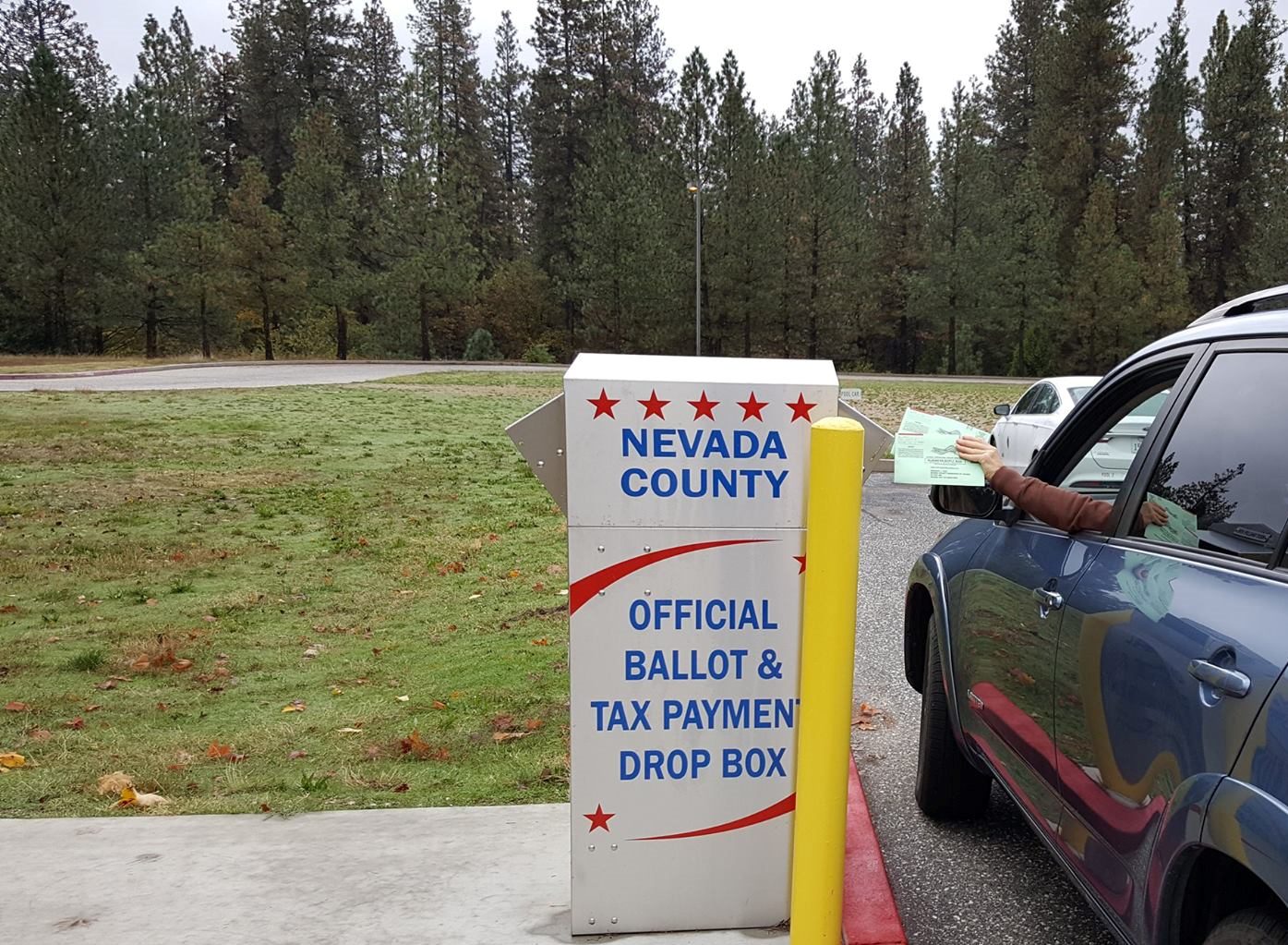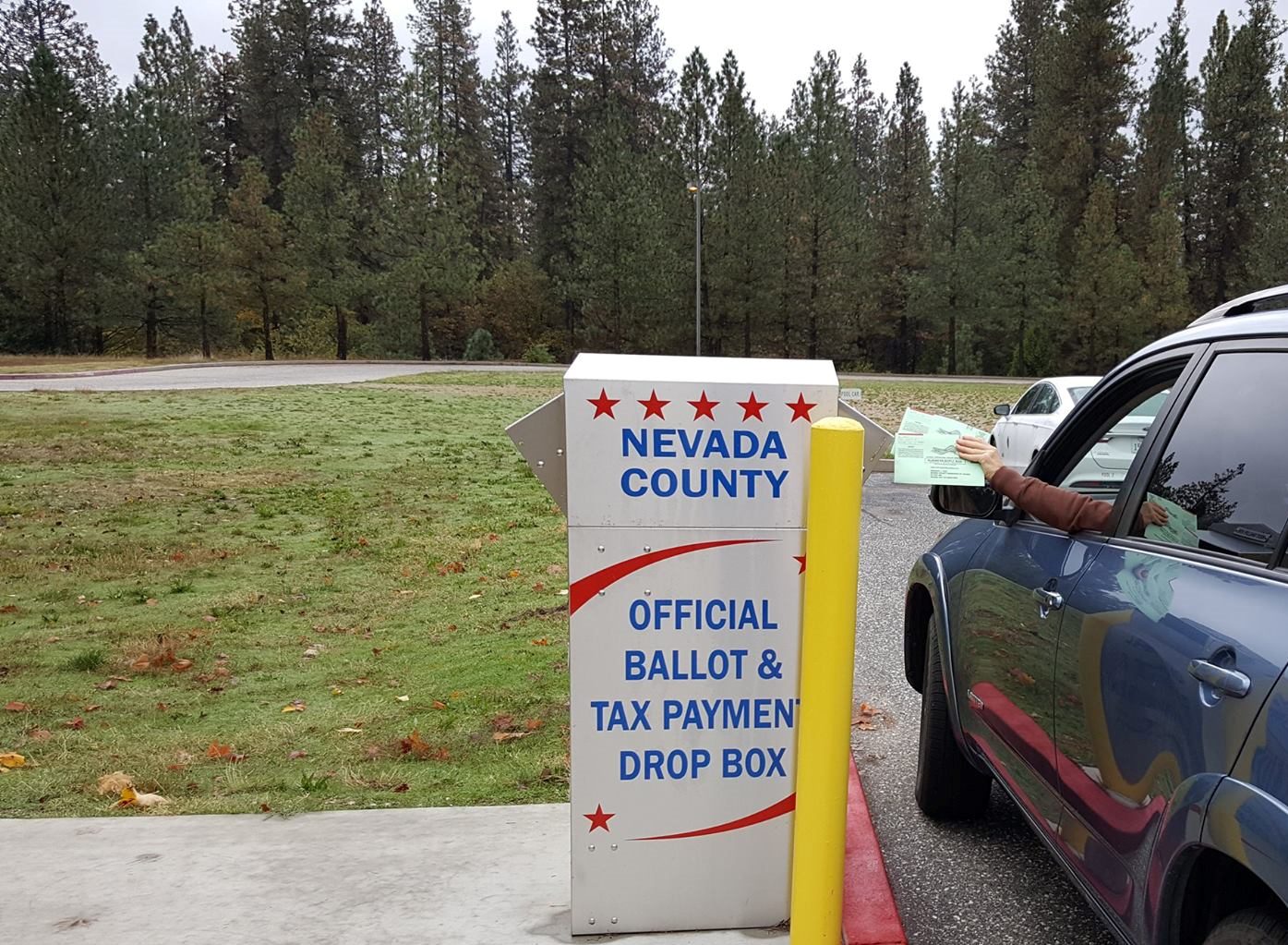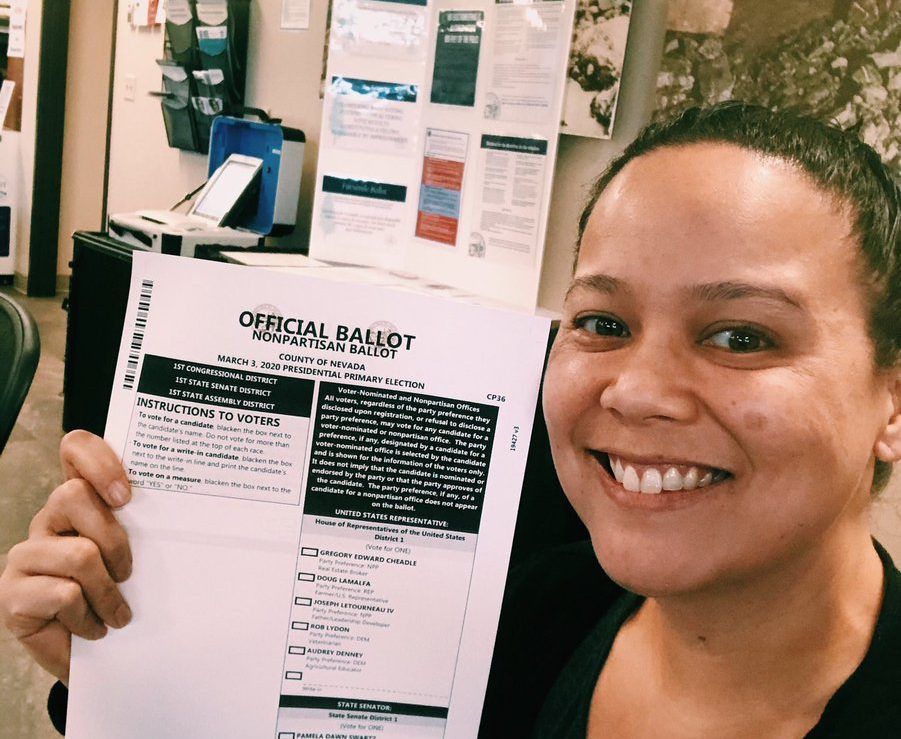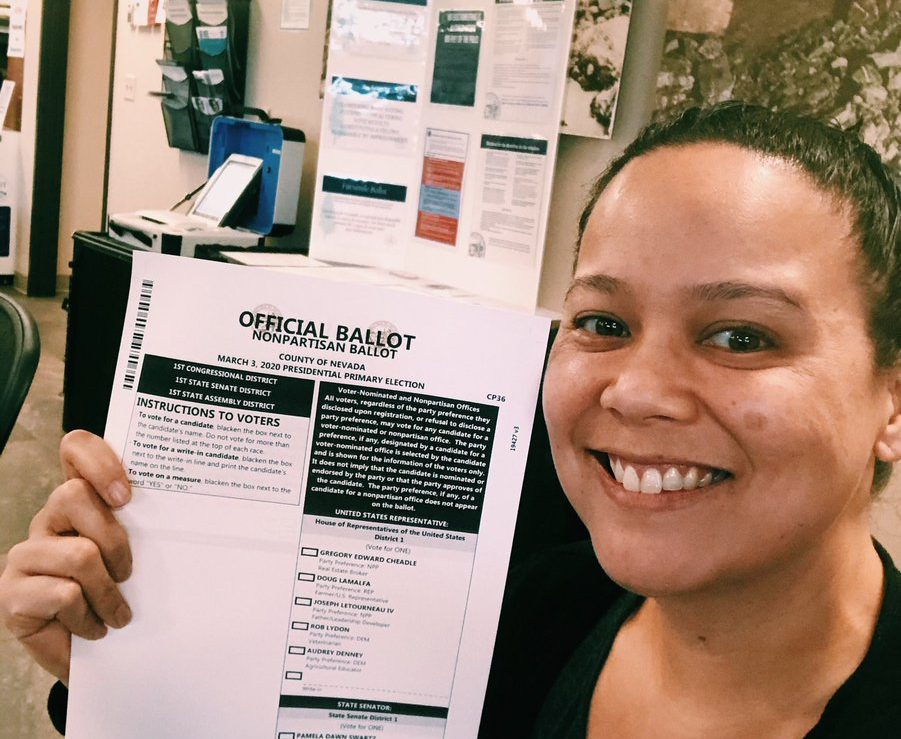“The Truth Was On My Side”: Election Official Beats Back Fraud Conspiracies
Natalie Adona won a county clerk-recorder election last week in California’s Nevada County that showcased the effects of the Big Lie on local politics.
Daniel Nichanian | June 13, 2022


Donald Trump’s lies about the 2020 election have fueled a torrent of harassment against election officials, many of whom fear for their safety. Natalie Adona, who works in the office of the clerk-recorder and registrar of voters in Nevada County, in northeast California, experienced this first hand and hears about it from many of her peers.
Still, Adona chose to run to be her county’s chief election official this year, after her boss decided to retire. What followed was an ugly campaign that drew attention from the Los Angeles Times after a mailer called Adona, who is Asian American, a “carpetbagger.” Adona has been furiously targeted by the local right since anti-mask protesters refused to wear a mask in the elections office in January, and a website sprang up to attack her.
One of Adona’s two opponents was the founder of a local group of election auditors; he claimed that the 2020 election was invalid and demanded an end to mail voting. The other, endorsed by local Republicans, called for new measures to address a supposed lack of election security, such as involving sheriff’s deputies in transporting mail ballots.
When the dust cleared last week, Adona won by an overwhelming margin. As of publication, she has secured nearly 70 percent of the vote against her two rivals, who received just above 30 percent combined.
Nevada County sticks out in California’s staunchly conservative northeast as a lightly blue area that voted for Joe Biden in 2020 and opposed Gavin Newsom’s recall last year. Still, Adona won by a considerably larger margin than the 14 percentage points by which Biden carried the county over Trump in 2020, or the 8 percentage points by which the recall election lost.
Bolts talked to Adona about her reaction to her win and the political climate around voting procedures, and about what she would tell other election officials who face harassment. A self-proclaimed “elections junkie,” Adona recently received an award from the Election Verification Network, a national nonprofit, and contributed to a journal on election administration. She worked at the Democracy Fund, a foundation that works on buttressing democratic procedures, before joining Nevada County’s elections office.
Adona also addressed how election administrators can better help people register and vote; Nevada County has one of California’s highest turnout rates, though thousands remain unregistered, and the community’s spread-out nature carries challenges of its own. “Sending everyone a ballot is a great way to reach people,” Adona said, praising California’s recent reforms.
—
After a difficult campaign, what is your reaction to your victory?
Obviously, I’m happy with the result. I think that in Nevada County, we have a large diversity of opinions out here, but I think for the most part, people want to see government employees with experience, they want their elected officials to act professionally, and they believe in hard work and fair play. And I think that’s what I represent.
Your opponents lobbed false claims about the 2020 presidential election, which is something we’re seeing elsewhere in the country. How did that issue play out during your campaign?
What I have said, time and again, is that we run free and fair elections. I operate on facts, and the facts are that we had a smooth election and 2020, we had a smooth election during the gubernatorial recall, and again here for the 2022 primary. There are some people who try to stress test the system, and we catch them but voter fraud is so rare that it’s not going to overturn the outcome of any one election. I am an administrator, and out of all of my years working, I have not seen anything on a scale so large that it would cause me to worry about the election result. So I do invite members of the public, especially those who are skeptical, to come into our office to observe, ask us questions, and really learn how the process works.
One of your opponents demanded an audit of election results, and also attacked the reliability of mail voting. What is your response?
I think that, unfortunately, there are some people who’ve been fed a diet of myths and misinformation about the way elections work. I can say definitively that we audit our elections, and we do so under the law. From what I’ve understood, the type of audit that some of these folks are requesting is the same kind that occurred in Maricopa County, Arizona, and under California law, that is not a legal type of audit. We need to follow all of the procedures that are set forth by law, and one of those things is to only have authorized persons accessing voting equipment, any unauthorized access would decertify our equipment and probably result in penalties for election officials. I am not interested in creating liability for us. We follow the rules, we follow the procedures, we do accuracy testing ahead of every election, we do a post-election audit, we use only ballot paper that is certified by the state for use in California. We do it right.
What was your reaction to the personal attacks that you also faced during the campaign?
It was hurtful, obviously, but it didn’t surprise me. It didn’t surprise me, one because there was an incident involving mask-wearing that occurred at my office that resulted in a restraining order against one of our citizens. And so I sort of expected that there would be some pushback on my candidacy.
I think the other part of it is that there does seem to be a trend toward trying to intimidate or harass people who have demonstrated experience, and of the candidates who ran for my office, I was the only one with demonstrable experience.
There have been many reports of harassment and intimidation against election officials around the country. Have you had conversations about this with officials elsewhere?
Oh, I’ve talked about it with my peers quite a bit. There was a wave of retirements after the 2020 election because I think it was really hard. In some cases, there were people who were going to retire anyway, and I think after many years of public service, one would think that you deserved to have a nice retirement. But there were others who maybe retired a little bit sooner than they wanted to because the environment just got too tough. And I respect that there are some people who choose not to speak publicly about that, but I’m pretty confident that fatigue from all of the threats, harassment and intimidation plays a huge factor for some people.
Having just won this election with a towering majority, what would you tell other officials who may be sensing intimidation?
What I would say to my peers is, one, you have an entire community who is on your side. So I think it’s comforting in a way to know that there are peers who understand what you’re going through. And what I’d also say is, the truth will be on our side; and I feel very fortunate that the truth was on my side because I was the one with experience, and I seem to have prevailed.


Nevada County has among the highest rates of voter turnout in California, far above the state’s average. What lessons do you draw from this?
If I had the magic formula for high turnout, then I would definitely package that up and sell it for a price. But I think that, for Nevada County, yeah, age is definitely one factor. I also think that Nevada County is highly educated and affluent. Statistically, the older you are, and if you own property, the more likely you are to vote.
There’s also a strong culture of voting by mail here. Nevada County opted into the Voters Choice Act in 2018, an opt-in way of administering elections where you send everyone a ballot, establish vote centers and dropboxes, and permit voting for a long period. I think that sending everyone a ballot is a great way to reach people.
So I would say to other counties, one great way to get people voting is to send them a ballot. And in California, we now have a requirement that all counties need to mail active registered voters a ballot, regardless of whether they’re part of the Voters Choice Act or not. [Editor’s note: California permanently adopted universal mail-in voting, meaning that every registered voter in the state will now be sent a ballot, last fall.]
Inversely, what are challenges for ballot access in a less dense, more spread out area like Nevada County?
I think that we have challenges that aren’t entirely dissimilar to more populated areas. We have a community of young people who, I think, aren’t used to voting, maybe don’t know so much about elections. So I think there’s an ongoing challenge to get at everyone. We do have a community college in Nevada County, and think that it’d be great to engage with young people even more.
We also have a growing community of Spanish-speaking voters who could probably get more information from our office in Spanish, and perhaps, more engagement from our office for the Spanish-speaking community.
We also have a very large unincorporated area; and everyone’s sort of spread out, so there’s a big chunk of our voters who may not have access to things like one of our drop boxes, they may have to rely on the US Postal Service to return their ballots. The good thing is that we have way more drop boxes than what is statutorily required of us.
As of early 2020, about 14 percent of eligible voters were not registered to vote at all in Nevada County. How will you continue making sure that more people are registered? California adopted an automatic voter registration process but there are calls to improve it; are there ways to strengthen it?
California has automatic voter registration via DMV transaction, and there is an opportunity for the voter to opt out if they do not wish to be registered. You know, I think that the automatic registration program is sometimes confusing to voters: They’re not quite sure still how it works. So I think one of the things that we tried to do in our office is to let people know that voter registration is part of every DMV transaction, regardless of whether the voter wants that to be the case or not. I think the easiest thing, that I have no control over, is making sure that the interaction between the voter and the DMV results in clear directions for the voter on how registration plays a role in that transaction.
People retain the right to vote when detained in the local jail, but we often see major issues of access in this space. How do you ensure those eligible voters can cast ballots?
We work with the jail facility, and we make sure to provide voter registration cards and information about elections. So if you are registered, and if your registration is updated, you receive your ballot while you are in custody at the jail. The inmate has to work with the facility in order to get that ballot, and then figure out a way to return it, but like I said we send everyone a ballot by mail.
I think that, obviously, voter education is made tougher if you are incarcerated, so we do try to send materials and informational guides to people who are currently housed at the jail, and I think it’s up to them whether or not they want to participate. But you know, I do think that there’s probably a misconception that because you are incarcerated that you just don’t have the right to vote; there’s also the issue of someone who doesn’t realize that even though they’re on parole, they have a right to vote. There’s a lot I would like to be able to communicate to folks. .
The interview has been edited for length and clarity.


